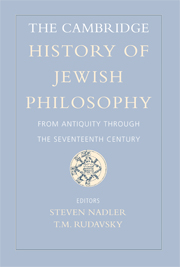Book contents
- Frontmatter
- Introduction
- 1 Texts and Contexts
- II Logic and Language
- III Natural Philosophy
- IV Epistemology and Psychology
- V Metaphysics and Philosophical Theology
- 17 God’s Existence and Attributes
- 18 Creation and Emanation
- 19 Theodicy and providence
- 20 Divine Omnipotence, Omniscience, and Human Freedom
- VI Practical Philosophy
- Biobibliographical Appendix
- Bibliography
- Index
- References
20 - Divine Omnipotence, Omniscience, and Human Freedom
from V - Metaphysics and Philosophical Theology
Published online by Cambridge University Press: 28 May 2009
- Frontmatter
- Introduction
- 1 Texts and Contexts
- II Logic and Language
- III Natural Philosophy
- IV Epistemology and Psychology
- V Metaphysics and Philosophical Theology
- 17 God’s Existence and Attributes
- 18 Creation and Emanation
- 19 Theodicy and providence
- 20 Divine Omnipotence, Omniscience, and Human Freedom
- VI Practical Philosophy
- Biobibliographical Appendix
- Bibliography
- Index
- References
Summary
Is anything impossible for the Lord?
(Genesis 18:14)Know this for a certain, that your descendants will be aliens living in a land that is not theirs; they will be slaves, and will be held in oppression there for four hundred years.
(Genesis 15:13)Choose life.
(Deuteronomy 30:19)INTRODUCTION
The religious traditions of Judaism, Christianity, and Islam all seem to require belief in God’s unlimited power, all-encompassing knowledge, and human choice. The Bible is full of stories about miracles, but how would miracles be possible if God is not omnipotent? Prophecy is an essential component of scripture, but would prophecy be possible if God did not know the future? Man is commanded to perform all kinds of commandments. If he obeys, he is rewarded; if he disobeys, he is punished. This presupposes that he has the choice to obey or disobey, and thus is responsible for his choices. Once we begin to reflect on these religious dogmas, we realize that things may not be so clear. Is God’s power really unlimited? Can He do the impossible? Moreover, if God is truly omniscient and knows the future, are the outcomes of the future so fixed that no alternatives are possible? If so, it would seem that man is not really free when he appears to be making a choice. It is thus no surprise that the philosophical and theological literature of Judaism, Christianity, and Islam are replete with discussions of these perplexing problems.
- Type
- Chapter
- Information
- The Cambridge History of Jewish PhilosophyFrom Antiquity through the Seventeenth Century, pp. 659 - 704Publisher: Cambridge University PressPrint publication year: 2008
References
- 3
- Cited by

